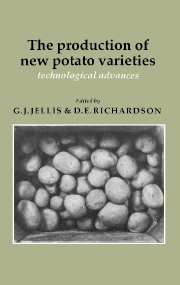Book contents
- Frontmatter
- Contents
- List of contributors
- Preface
- Editors' note and acknowledgements
- Introduction
- The development of potato varieties in Europe
- Genetic Resources
- Breeding Strategies
- Selection and Screening Methods
- Variety Assessment
- Semi-conventional Breeding Methods
- True Potato Seed
- Unconventional Breeding Methods
- Recent progress in molecular biology and its possible impact on potato breeding: an overview
- Combined application of classical and unconventional techniques in breeding for disease resistant potatoes
- Auther colture of dihaploid Solanum tuberosum H3 703
- Genetic manipulation in potato using Agrobacterium
- Prospects of using tumour-inducing plasmid-mediated gene transfer for the improvement of potato varieties
- Use of protoplast fusion and somaclonal variation in potato breeding
- The potential value of somaclonal variants in potato improvement
- Use of in vitro culture of Solanum tuberosum in potato breeding
- Commentary
- Index
The potential value of somaclonal variants in potato improvement
Published online by Cambridge University Press: 05 March 2012
- Frontmatter
- Contents
- List of contributors
- Preface
- Editors' note and acknowledgements
- Introduction
- The development of potato varieties in Europe
- Genetic Resources
- Breeding Strategies
- Selection and Screening Methods
- Variety Assessment
- Semi-conventional Breeding Methods
- True Potato Seed
- Unconventional Breeding Methods
- Recent progress in molecular biology and its possible impact on potato breeding: an overview
- Combined application of classical and unconventional techniques in breeding for disease resistant potatoes
- Auther colture of dihaploid Solanum tuberosum H3 703
- Genetic manipulation in potato using Agrobacterium
- Prospects of using tumour-inducing plasmid-mediated gene transfer for the improvement of potato varieties
- Use of protoplast fusion and somaclonal variation in potato breeding
- The potential value of somaclonal variants in potato improvement
- Use of in vitro culture of Solanum tuberosum in potato breeding
- Commentary
- Index
Summary
INTRODUCTION
The regeneration of potato plants from somatic tissues such as leaf mesophyll protoplasts is now well established (Gunn 1982). Examination of the somaclones raised from these tissues has revealed variation for a range of characters, some such as resistance to common scab (Streptomyces spp.) being of economic importance in potato breeding (Gunn et al. 1985). However it has been demonstrated that the variation occurs only for a limited number of characters and in many respects the somaclones are identical to the parental variety from which they were derived (Secor & Shepard 1981). This suggests that it may be possible to upgrade existing varieties by selecting amongst somaclones for improvements in those characters in which the parental variety performs poorly while maintaining the same level of character expression for those characters in which the parental variety performs well (Thomson et al. 1986). Some recent data obtained to explore this possibility are reported here.
MATERIALS AND METHODS
The data were recorded from field trials of somaclones derived from either Feltwell or Maris Piper which are varieties bred at the Plant Breeding Institute, Cambridge. The trials comprised either two or three replicates of six-tuber plots grown in 1984 and 1985. Total harvested yield and general tuber appearance were recorded. In 1985 the produce from those somaclones selected from the 1984 trials was riddled to obtain the different size grades of the tubers.
- Type
- Chapter
- Information
- The Production of New Potato VarietiesTechnological Advances, pp. 327 - 330Publisher: Cambridge University PressPrint publication year: 1987
- 4
- Cited by



